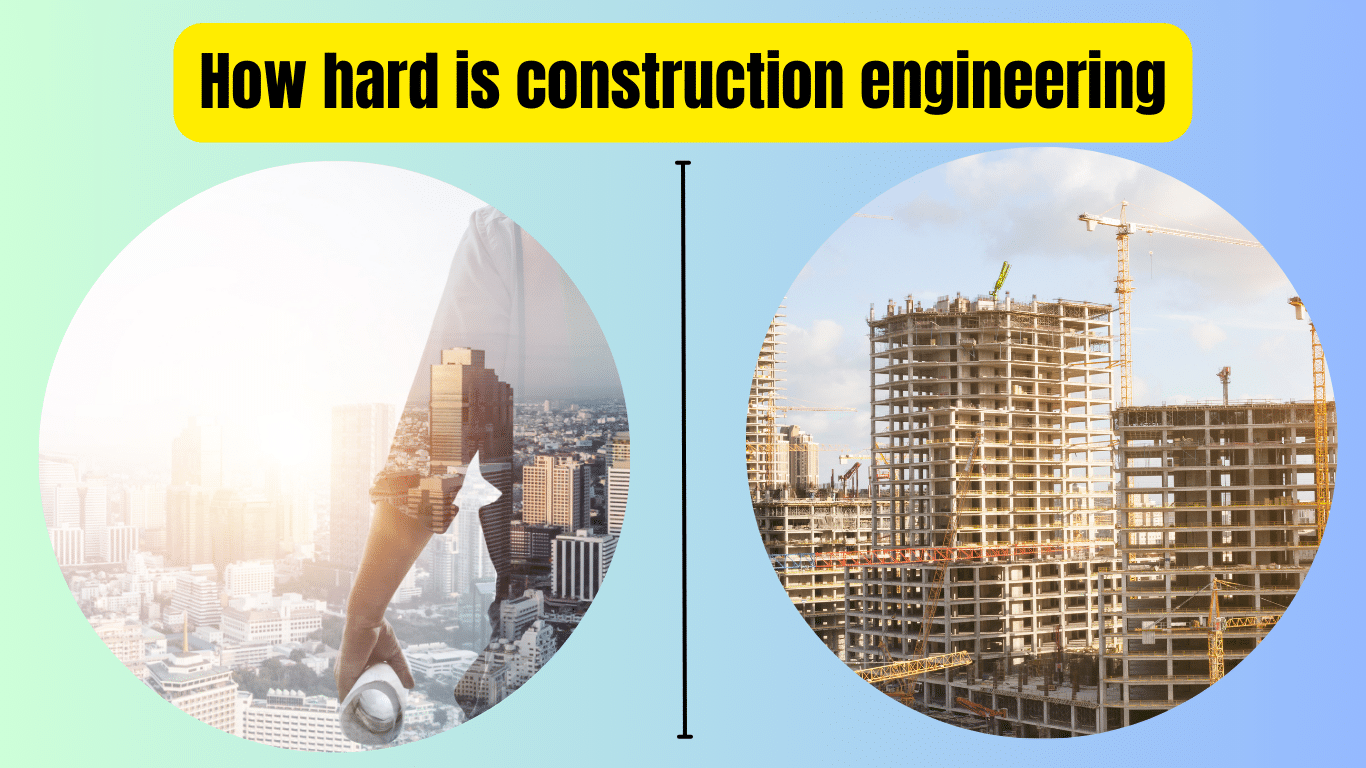Construction engineering can be challenging, but it’s also rewarding. It involves designing, planning, and overseeing the building of structures like roads, bridges, and buildings. The difficulty varies depending on factors like the complexity of the project, site conditions, and regulations. Some aspects of construction engineering, like math and physics, can be tough, but with dedication and effort, they can be mastered.
It’s essential to have good problem-solving skills and attention to detail in this field. While it can be hard work, seeing a project come together successfully makes it all worth it. If you’re considering a career in construction engineering, know that while it may be challenging, it’s also filled with opportunities for growth and accomplishment.
How hard is construction engineering? Exploring the Challenges and Rewards
Construction engineering is a dynamic field that involves designing, planning, and overseeing the construction of various structures, including buildings, roads, bridges, and more. While it offers numerous opportunities for growth and innovation, many wonder about the level of difficulty involved in pursuing a career in construction engineering. In this article, we’ll delve into the challenges faced by construction engineers as well as the rewards that come with overcoming them.
Understanding Construction Engineering
Before delving into the difficulty of construction engineering, it’s essential to understand what it entails. Construction engineers are responsible for ensuring that construction projects are completed safely, efficiently, and within budget. They must possess a strong understanding of engineering principles, construction techniques, and project management.
The Challenges of Construction Engineering
- Complexity of Projects
- Technical Skills are required.
- Site Conditions and Regulations
- Project Management
- Safety Concerns
Complexity of Projects: Construction projects can vary significantly in complexity, from small-scale residential buildings to large-scale infrastructure projects like bridges and highways. Managing the intricacies of these projects requires careful planning and coordination.
Technical Skills Required: Construction engineering involves applying principles of mathematics, physics, and engineering to real-world problems. This requires a solid foundation in these subjects and the ability to apply them effectively in a practical setting.
Site Conditions and Regulations: Construction engineers must navigate various site conditions, including environmental factors, soil composition, and existing infrastructure. Additionally, they must adhere to local building codes and regulations, which can vary significantly from one location to another.
Project Management: Effective project management is crucial in construction engineering to ensure that projects are completed on time and within budget. This involves coordinating with contractors, suppliers, and other stakeholders, as well as managing resources and resolving conflicts.
Safety Concerns: Safety is a top priority in construction engineering, and engineers must implement measures to mitigate risks and ensure the safety of workers and the public. This includes adhering to safety regulations, conducting regular inspections, and implementing safety protocols.
Overcoming the Challenges
While construction engineering presents various challenges, there are strategies for overcoming them:
- Continuous Learning
- Effective Communication
- Collaboration and Teamwork
- Adaptability and Problem-Solving
Continuous Learning: Construction engineers must stay updated on the latest advancements in construction techniques, materials, and technologies. This may involve pursuing continuing education courses or professional certifications to enhance their skills and knowledge.
Effective Communication: Clear and concise communication is essential in construction engineering to ensure that all stakeholders are on the same page. This includes communicating project requirements, timelines, and expectations effectively.
Collaboration and Teamwork: Construction projects involve collaboration among various stakeholders, including architects, contractors, and engineers. By fostering a collaborative work environment and leveraging each team member’s expertise, construction engineers can overcome challenges more effectively.
Adaptability and Problem-Solving: Construction projects are dynamic and often present unexpected challenges. Construction engineers must be adaptable and adept at problem-solving to address issues as they arise and keep the project on track.
The Rewards of Construction Engineering
While construction engineering may pose challenges, it also offers numerous rewards:
- Seeing Projects Come to Life
- Making a Positive Impact
- Professional Growth and Development
- Financial Rewards
Seeing Projects Come to Life: One of the most rewarding aspects of construction engineering is seeing a project come to fruition from conception to completion. Whether it’s a new skyscraper, a highway interchange, or a community park, witnessing the tangible results of your hard work is incredibly gratifying.
Making a Positive Impact: Construction engineers play a vital role in shaping the built environment and improving the quality of life for communities. Whether it’s providing essential infrastructure, creating sustainable buildings, or revitalizing urban spaces, construction engineers have the opportunity to make a positive impact on society.
Professional Growth and Development: Construction engineering offers ample opportunities for professional growth and development. Whether through gaining experience on diverse projects, pursuing advanced degrees or certifications, or taking on leadership roles, construction engineers can continuously expand their skills and expertise.
Financial Rewards: Construction engineering can be financially rewarding, with competitive salaries and opportunities for advancement. As experienced professionals, construction engineers may also have the opportunity to start their own consulting firms or pursue entrepreneurial ventures.
Some key points: How hard is construction engineering?
How hard is a construction management degree compared to engineering degrees?
A construction management degree is different from traditional engineering degrees in that it focuses more on the management and logistical aspects of construction projects rather than the technical engineering aspects. While both fields require dedication and hard work, some may find construction management less challenging in terms of complex math and physics compared to traditional engineering disciplines. However, construction management still involves rigorous coursework and practical experience in project planning, scheduling, budgeting, and resource management.
Is construction management hard?
Construction management can be challenging, but it depends on individual strengths and interests. While it may not require as much technical expertise in areas like math and physics as traditional engineering disciplines, it does demand strong organizational, communication, and problem-solving skills. Success in construction management often hinges on the ability to effectively coordinate and manage multiple aspects of a construction project, including scheduling, budgeting, and personnel management.
Why should I choose construction engineering?
Choosing construction engineering can be a rewarding decision for several reasons. Firstly, it offers the opportunity to be involved in the creation of tangible structures and infrastructure that shape communities and improve lives. Additionally, construction engineering provides a diverse range of career paths, from designing buildings and bridges to managing construction projects. It also offers competitive salaries and opportunities for professional growth and advancement.
What are construction engineering courses?
Construction engineering courses cover a wide range of topics related to the planning, design, construction, and management of various structures and infrastructure projects. Some common courses include structural engineering, construction materials and methods, project management, construction law and regulations, and sustainable construction practices. These courses typically combine theoretical knowledge with practical, hands-on experience through projects and internships.
Is construction management an engineering degree?
While construction management shares similarities with engineering disciplines, it is not typically considered an engineering degree. Instead, construction management focuses on the managerial and logistical aspects of construction projects, such as planning, scheduling, budgeting, and coordinating resources. While engineering degrees often involve more emphasis on technical design and analysis, construction management emphasizes project execution and delivery.
Why did you choose construction engineering and management as your specialized course?
Choosing construction engineering and management as a specialized course can offer a unique blend of technical and managerial skills that are highly valued in the construction industry. This specialization allows individuals to gain expertise in both the engineering aspects of construction, such as structural design and analysis, as well as the management aspects, such as project planning, scheduling, and budgeting. With this combination of skills, individuals can pursue diverse career opportunities in various sectors of the construction industry.
Construction engineering vs civil engineering
While construction engineering and civil engineering share some similarities, they also have distinct differences. Civil engineering focuses on the design, construction, and maintenance of infrastructure projects such as roads, bridges, and water systems. Construction engineering, on the other hand, is more focused on the construction process itself, including project management, scheduling, and resource allocation. While civil engineering deals with the design aspect, construction engineering focuses on implementing those designs efficiently and effectively.
Construction engineering services
Construction engineering services encompass a wide range of activities related to the planning, design, construction, and management of construction projects. These services may include feasibility studies, site analysis, structural design, construction management, quality control, and project scheduling. Construction engineering services are essential for ensuring that construction projects are completed safely, efficiently, and within budget while meeting the needs of clients and stakeholders.
Construction engineering and management
Construction engineering and management is a specialized field that combines engineering principles with management techniques to oversee construction projects effectively. Professionals in this field are responsible for coordinating various aspects of construction projects, including planning, scheduling, budgeting, and resource management. They must possess a strong understanding of engineering concepts as well as project management principles to ensure the successful completion of construction projects.
Construction engineering and management courses
Construction engineering and management courses cover a range of topics related to both engineering and management aspects of construction projects. These courses may include construction project management, construction law and contracts, construction scheduling and estimating, construction finance and economics, and risk management in construction. By integrating engineering and management principles, these courses prepare students for successful careers in construction engineering and management roles.
Conclusion
In conclusion, construction engineering presents various challenges, from managing complex projects to navigating site conditions and regulations. However, with the right skills, mindset, and strategies, these challenges can be overcome, leading to a rewarding and fulfilling career. By embracing continuous learning, effective communication, collaboration, and adaptability, construction engineers can make a positive impact on the built environment and reap the rewards of their hard work and dedication.
FAQs
Is construction engineering a difficult field to study?
Construction engineering can be challenging, but with dedication and effort, it’s manageable. It involves understanding various technical concepts and applying them to real-world construction projects.
Do I need to be good at math and science to succeed in construction engineering?
While a solid foundation in math and science is beneficial, you don’t need to be a math genius to excel in construction engineering. Basic math skills and an understanding of scientific principles are essential for solving problems and making informed decisions.
Are there specific skills required for construction engineering?
Yes, construction engineering requires a combination of technical skills, such as understanding structural design and construction methods, and soft skills, such as communication, problem-solving, and attention to detail.
How does the workload in construction engineering compare to other fields of engineering?
The workload in construction engineering can vary depending on the project and the stage of construction. It may involve long hours and tight deadlines, especially during peak construction seasons.
Is construction engineering more hands-on or theoretical?
Construction engineering is a mix of both theoretical knowledge and hands-on experience. While you’ll learn engineering principles in the classroom, you’ll also gain practical experience through internships, co-ops, and on-site construction work.
What are some common challenges faced by construction engineers?
Challenges in construction engineering can include managing project budgets and schedules, navigating complex regulations and codes, coordinating with various stakeholders, and addressing unexpected issues that arise during construction.
Is construction engineering a good career choice?
Yes, construction engineering offers rewarding career opportunities with competitive salaries and opportunities for advancement. It allows you to play a vital role in building infrastructure and shaping the world around us.
Can I specialize in a specific area within construction engineering?
Yes, there are various specialization options within construction engineering, such as structural engineering, transportation engineering, environmental engineering, and construction management. You can choose a specialization based on your interests and career goals.
What are some resources available to help me succeed in construction engineering?
There are many resources available to students and professionals in construction engineering, including textbooks, online courses, professional organizations, industry publications, and networking opportunities.
How can I prepare for a career in construction engineering?
To prepare for a career in construction engineering, focus on building a strong foundation in math and science during high school and consider pursuing a degree in civil engineering or construction engineering. Gain practical experience through internships or co-op programs, and stay updated on industry trends and advancements. Developing strong communication and problem-solving skills will also be beneficial for success in this field.






